-
【C++】类的声明 与 类的实现 分开 ② ( 头文件导入多次报错 | 头文件的作用 | 类的声明 | 类的实现 | 代码示例 - 类的使用 )
一、头文件导入多次报错
1、头文件没有 #pragma once 报错
在 .cpp 源码文件中 , 使用
#include "Student.h"代码 , 包含头文件 ,使用
#include "Student.h" #include "Student.h"- 1
- 2
代码 的作用 , 相当于将 Student.h 头文件中的所有内容 , 拷贝了 2 次 ,
其效果类等同于 :
class Student { }; class Student { };- 1
- 2
- 3
- 4
- 5
- 6
编译时会报如下 " “Student”:“class”类型重定义 " 错误 :
1>------ 已启动生成: 项目: HelloWorld, 配置: Debug Win32 ------ 1>Student.cpp 1>Y:\002_WorkSpace\002_VS\HelloWorld\HelloWorld\Student.h(15,1): error C2011: “Student”:“class”类型重定义 1>Y:\002_WorkSpace\002_VS\HelloWorld\HelloWorld\Student.h(14): message : 参见“Student”的声明 1>已完成生成项目“HelloWorld.vcxproj”的操作 - 失败。 ========== 生成: 成功 0 个,失败 1 个,最新 0 个,跳过 0 个 ==========- 1
- 2
- 3
- 4
- 5
- 6
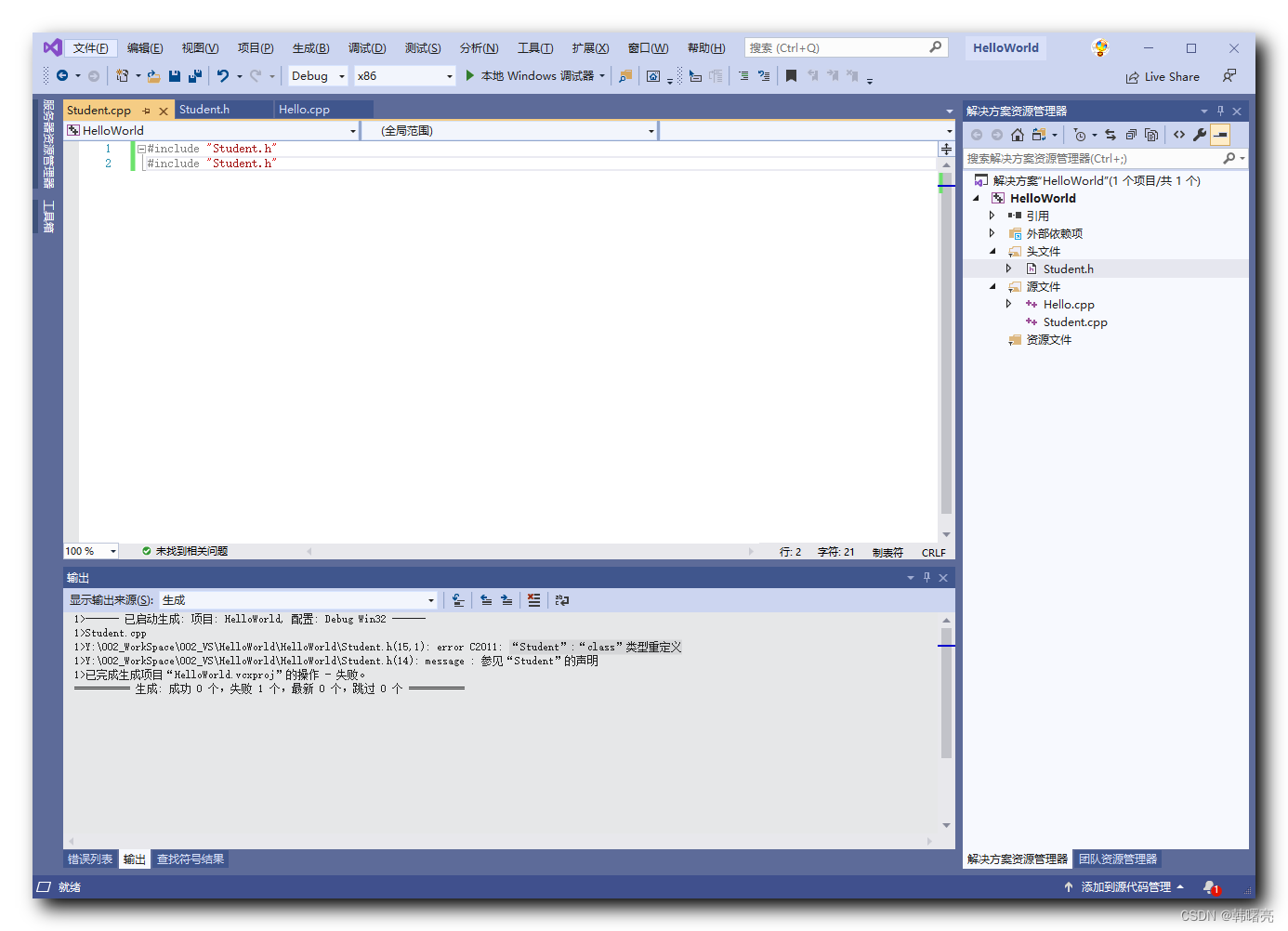
2、头文件加上 #pragma once 编译成功
在头文件中 , 加上了
#pragma once代码 , 即使在代码中 , 导入了 2 次头文件 , 也可以正常编译 , 不会报错 ;#include "Student.h" #include "Student.h"- 1
- 2
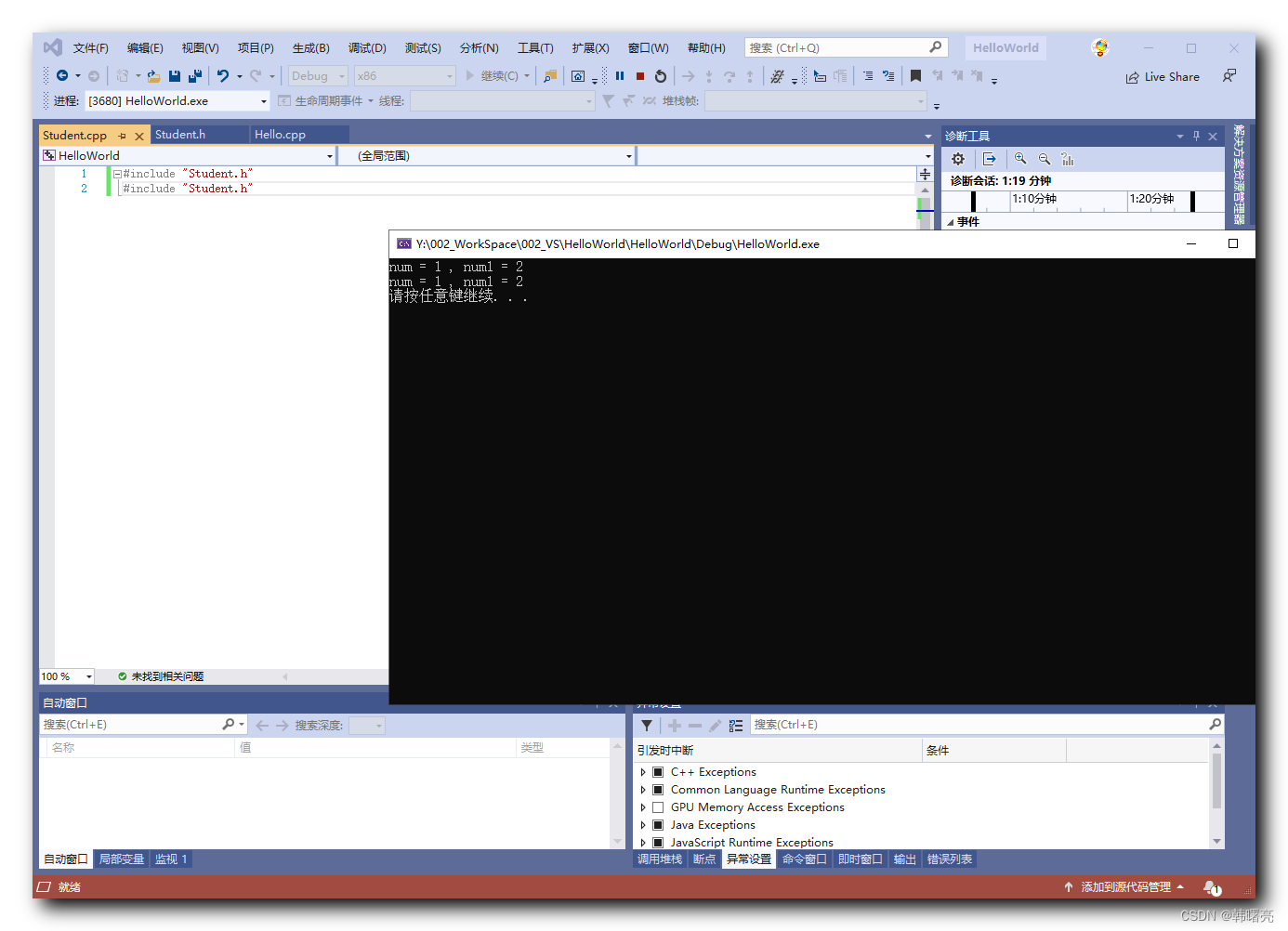
二、头文件的作用
在 .h 头文件中 , 只是对 变量 / 类 / 函数 , 进行声明 , 不实现它们 ;
导入 .h 头文件 的 作用是可以访问这些 变量 / 类 / 函数 的 声明 ;
在 实际 开发中 , 有两种情况下是需要导入 .h 头文件 的 :
- 以 实现 声明的 变量 / 类 / 函数 为目的 , 自己开发函数库 给别人用 ;
- 以 使用 声明的 变量 / 类 / 函数 为目的 , 使用别人开发的函数库 , 导入了头文件 , 即可访问头文件中声明的 变量 / 类 / 函数 ;
三、类的声明
在 Student.h 头文件中 , 定义 class Student 类 , 只声明该类 , 以及类的 成员属性 和 成员函数 ;
不实现 成员函数 ;
成员函数 在 对应的 Student.cpp 中实现 ;
代码示例 :
// 确保 该头文件 只包含一次 #pragma once /* // C 语言中可使用如下宏定义确保 头文件 只被包含一次 #ifndef Student_H #define Student_H // 源码主要内容 #endif // !Student_H */ class Student { private: int age; char name[64]; public: void setAge(int age); int getAge(); };- 1
- 2
- 3
- 4
- 5
- 6
- 7
- 8
- 9
- 10
- 11
- 12
- 13
- 14
- 15
- 16
- 17
- 18
- 19
- 20
- 21
- 22
- 23
四、类的实现
在 Student.cpp 源码中 , 导入 Student.h 头文件 , 这是 创建 Student 类时自动生成的 ;
在类中声明成员函数
void setAge(int age);, 如果没有实现该成员函数 , 鼠标移动上去后 , 会报如下错误 ;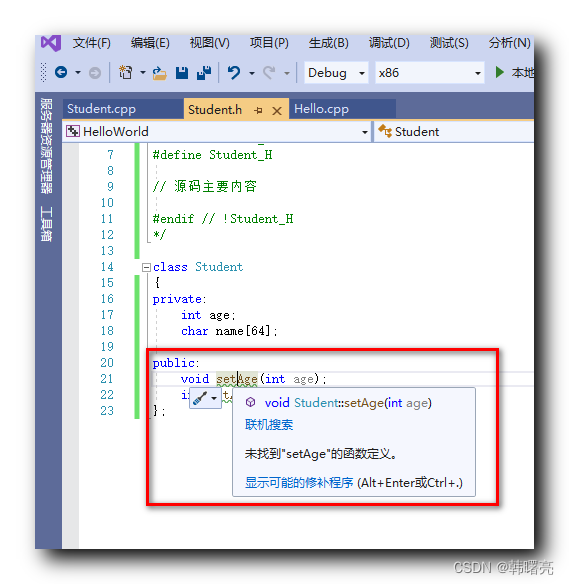
使用 Alt + 回车 快捷键 , 会给出修改提示 :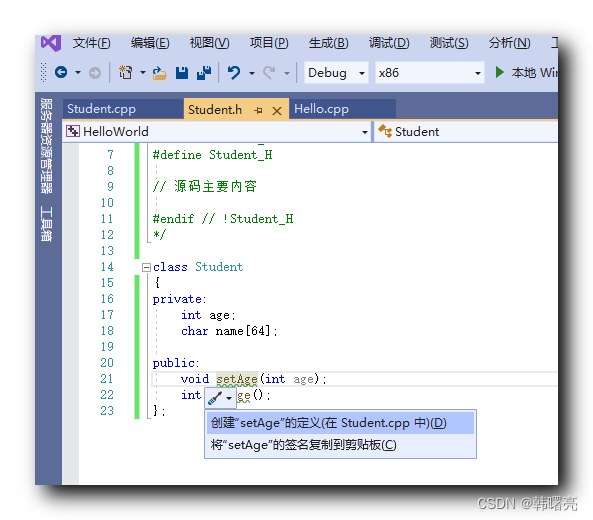
选第一个选项 , 即可在 Student.cpp 中生成实现该函数的代码 ;
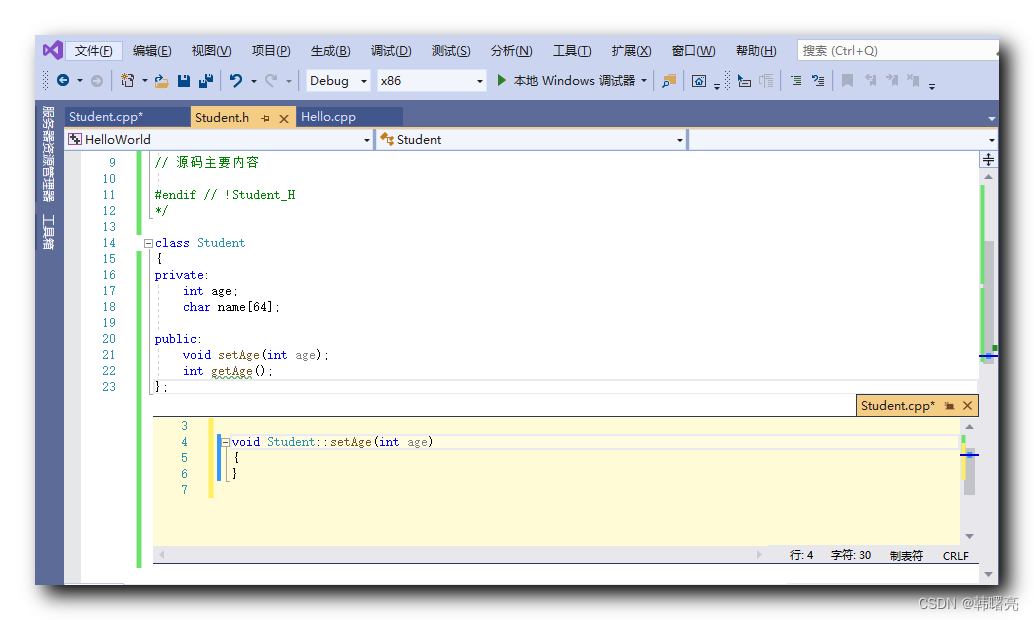
声明的 函数 ,void setAge(int age); int getAge();- 1
- 2
对应的 Student.cpp 中的方法如下 :
void Student::setAge(int age) { m_age = age; } int Student::getAge() { return m_age; }- 1
- 2
- 3
- 4
- 5
- 6
- 7
- 8
- 9
在 void Student::setAge(int age) 方法中 , 可以直接访问 Student 中的成员 , 使用 域作用符 等同于 类内部的环境 ;
五、代码示例 - 类的使用
首先 , 导入 Student.h 头文件 , 其中声明了类 , 可以直接使用类 ;
// 导入自定义类 #include "Student.h"- 1
- 2
然后 , 直接在 main 函数中使用 Student 类即可 ; 先声明类 , 为类成员赋值 , 然后打印类的成员 ;
Student s; s.setAge(18); cout<< s.getAge() << endl;- 1
- 2
- 3
main 入口程序代码
代码示例 :
// 导入标准 io 流头文件 其中定义了 std 命名空间 #include// 导入 std 命名空间 using namespace std; // 导入自定义类 #include "Student.h" int main() { Student s; s.setAge(18); cout<< s.getAge() << endl; // 控制台暂停 system("pause"); return 0; } - 1
- 2
- 3
- 4
- 5
- 6
- 7
- 8
- 9
- 10
- 11
- 12
- 13
- 14
- 15
- 16
- 17
- 18
- 19
执行结果 :
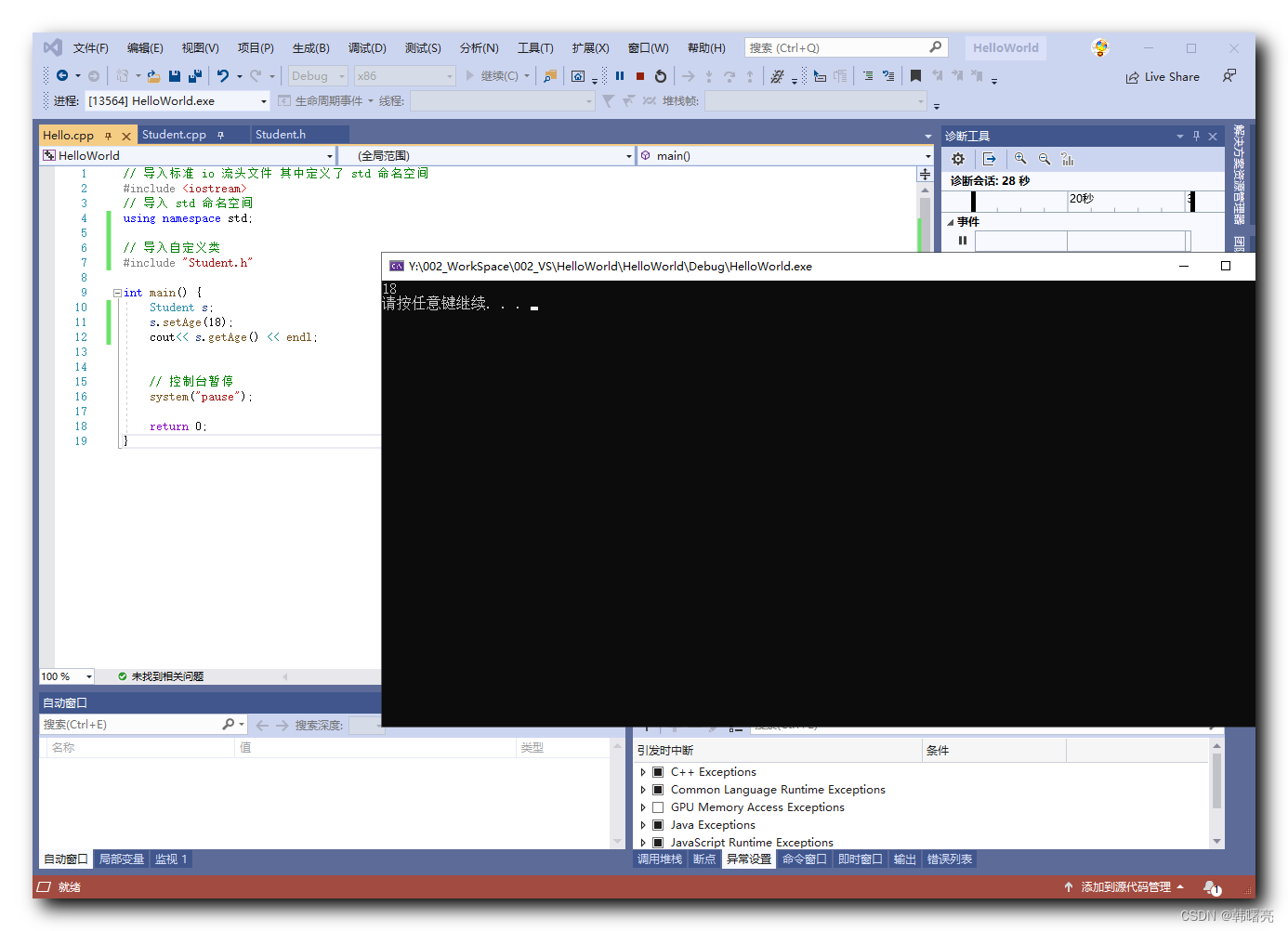
头文件代码
// 确保 该头文件 只包含一次 #pragma once /* // C 语言中可使用如下宏定义确保 头文件 只被包含一次 #ifndef Student_H #define Student_H // 源码主要内容 #endif // !Student_H */ class Student { private: int m_age; char m_name[64]; public: void setAge(int age); int getAge(); };- 1
- 2
- 3
- 4
- 5
- 6
- 7
- 8
- 9
- 10
- 11
- 12
- 13
- 14
- 15
- 16
- 17
- 18
- 19
- 20
- 21
- 22
- 23
类实现代码
#include "Student.h" void Student::setAge(int age) { m_age = age; } int Student::getAge() { return m_age; }- 1
- 2
- 3
- 4
- 5
- 6
- 7
- 8
- 9
- 10
- 11
-
相关阅读:
【译】.NET 8 网络改进(一)
学习ros机器人导航从精读nav2导航launch文件开始
k8s部署 多master节点负载均衡以及集群高可用
js逆向第一课 密码学介绍
【毕业季·进击的技术er】1076万毕业生,史上最难就业季?卷又卷不过,躺又躺不平,敢问路在何方?
DELM深度极限学习机回归预测研究(Matlab代码实现)
Python求解不等式优化问题
小程序如何刷新当前页面
uni-app使用uView打开弹出层后输入框聚焦时placeholder错位问题
<Senior High School Math>: inequality question
- 原文地址:https://blog.csdn.net/han1202012/article/details/132782820
